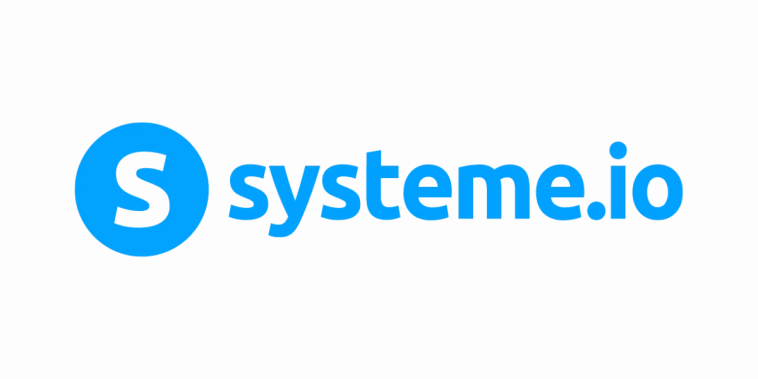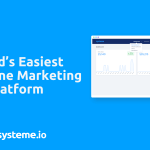Introduction.
If you’re thinking about starting a blog or moving your blog to a new platform, there’s a good chance you’ve heard of Systeme.io.
Maybe someone recommended it, maybe you stumbled across it during a late-night Google search, or maybe you’re just curious if it’s actually worth your time.
Blogging tools have exploded in number over the years—WordPress, Wix, Squarespace, Ghost—you name it.
So when a platform like Systeme.io comes into the mix promising blogging and marketing tools all in one place, it’s natural to stop and wonder: “Is this actually a good option for bloggers, or is it just more hype?”
I’ve spent time testing Systeme.io, digging into its features, and comparing it to other blogging tools I’ve used.
This post walks through what Systeme.io does well, where it might fall short, and who it’s really best for.
I’ll break things down simply, without all the techy lingo. If you’re trying to figure out if this platform is the right fit for your blog, you’re in the right place.
What is Systeme.io?
Systeme.io is an all-in-one platform designed mainly for online entrepreneurs. It lets you create sales funnels, build email lists, sell courses, and yes—run a blog.
It’s kind of like a mix of WordPress, ClickFunnels, Teachable, and Mailchimp… but all under one roof.
The idea is simple: instead of juggling five different tools, you manage your entire business from one dashboard.
That’s great in theory—but how does it stack up if your main goal is blogging?
Blogging with Systeme.io: The Basics
Systeme.io does have a blogging feature, but it’s not the platform’s main focus. It was added later as a way to help creators build content that drives traffic and email sign-ups. Here’s what it offers out of the box:
Easy Blog Setup
Creating a blog on Systeme.io is quick. There’s no need to mess around with hosting or plugins. You just go into your dashboard, create a “blog,” and start adding posts. If you’re someone who doesn’t want to deal with technical stuff, this is a huge plus.
Built-in SEO Tools
Systeme.io lets you add custom titles, meta descriptions, and URLs to your blog posts. It also automatically creates a sitemap.xml, which helps Google index your content.
While it’s not as advanced as tools like Yoast SEO on WordPress, it’s good enough for most people starting out.
Mobile-Responsive Design
All blog pages are automatically mobile-friendly. Your content will look good on phones, tablets, and desktops without you needing to tweak anything.
Blogging Meets Funnels
This is where Systeme.io stands out. You can connect your blog to lead capture forms, email automations, and sales funnels—all inside the same system.
If your blog’s goal is to grow an audience and sell something (like a course or coaching package), this setup can save you a lot of time.
What’s Missing or Not Great?
No platform is perfect. Here’s where Systeme.io still lags behind more traditional blogging platforms:
Limited Customization
The blog templates are simple—and while they look clean, there’s not much room for customization unless you know how to code. You can’t choose from a bunch of themes or add complex design elements the way you can with WordPress.
No Comments Section
At the time of writing, Systeme.io doesn’t have a built-in way for readers to leave comments on blog posts. That’s a dealbreaker for some bloggers who want to build a community through their content.
No Native Media Library
Uploading and managing images isn’t as smooth as it is on WordPress or Squarespace. There’s no central media library, so every time you want to reuse an image, you have to upload it again.
Who Is Systeme.io Best For?
If your blog is part of a bigger plan—like building an email list, selling digital products, or launching online courses—then Systeme.io can be a solid choice. It cuts down on tech headaches by putting everything in one place.
But if your blog is the product (like if you’re a writer or content creator who just wants to publish articles), you might find the platform limiting compared to something like WordPress.org.
Here’s a quick breakdown:
| Best For | Maybe Skip It If… |
|---|---|
| Beginners who want a simple blog + email setup | You want full control over design and layout |
| Course creators, coaches, service providers | You care a lot about blog aesthetics or comments |
| Bloggers focused on lead generation | You want advanced SEO tools and plugins |
How Much Does Systeme.io Cost?
Systeme.io is actually one of the few platforms that gives a lot for free.
Free Plan Includes:
- Blog hosting
- Email marketing (up to 2,000 contacts)
- 1 sales funnel
- 3 automation rules
- Unlimited blog posts and pages
If you outgrow the free plan, the next tier (Startup) is $27/month as of 2025.
This makes it a very cost-friendly choice for new bloggers compared to:
- WordPress with good hosting ($10–$30/month)
- Kajabi ($149/month)
- Clickfunnels ($97/month)
You can check current pricing here: Systeme.io Pricing
Can You Rank on Google with Systeme.io?
Yes, you can. But you’ll need to put in the usual SEO work: good keyword research, helpful content, and consistent publishing.
The platform won’t hold you back from ranking, but it also won’t give you the advanced SEO options you’d get on WordPress with dedicated plugins.
Still, if you’re writing good stuff and sharing it, your posts can absolutely show up on Google search results.
FAQs
Can I use my own domain?
Yes, you can connect a custom domain (like yourname.com) even on the free plan.
Is there a mobile app?
Not at the moment. You’ll need to manage your blog and content from the browser.
Can I schedule blog posts?
Currently, there’s no native scheduling feature for blogs. You’d need to manually publish your post when ready.
Is it secure and reliable?
Yes. Systeme.io is cloud-based and regularly updated. They handle hosting and backups for you.
Can I migrate my blog from WordPress?
There’s no automatic migration tool, so you’d need to manually copy/paste your content if switching over.
Final Thoughts
If you’re just starting a blog and want something simple, fast, and free—Systeme.io is a solid option. It’s especially good if you plan to grow your email list, sell something, or run a side business.
It won’t give you the advanced design freedom of other platforms, but it covers all the basics really well.
For experienced bloggers or folks focused 100% on content creation and SEO, the limitations might be a dealbreaker. But for beginner to intermediate users, it’s a surprisingly strong option—especially given the price (or lack of it).
So, back to the original question:
Is Systeme.io good for blogging?
What kind of blogger are you trying to be—and do you think Systeme.io fits that vision?





GIPHY App Key not set. Please check settings